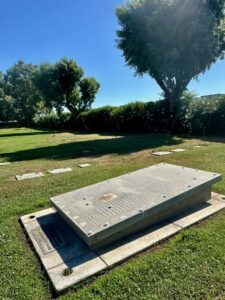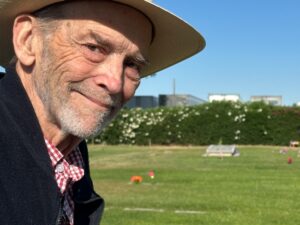by Lindajoy Fenley
posted May 31
In folk music circles, most people know Woody Guthrie’s song “Plane Crash at Los Gatos.”

But few ever visit Fresno’s Holy Cross Cemetery where a mass grave holds the remains of 28 farmworkers who died in the fiery 1948 plane crash that the song is about.
The song bemoans the fact that the farmworkers who were being deported to Mexico had no names in either news reports at the time of the crash or on a diminutive stone that marked their common grave at the edge of the little graveyard. The media reported only the names of the plane’s crew and the immigration officer who died in the crash with them. In protest, Guthrie made up generic names for the migrants and his 1948 words were put to music 10 years later by Martin Hoffman.
Goodbye to my Juan, Goodbye Rosalita
Adios, mis amigos, José y Maria
But something happened 10 or 15 years ago that erased the demeaning anonymity of the farmworkers. Tim Z. Hernandez, the son of farmworkers who grew up in California’s Central Valley and now teaches writing at the University of Texas in El Paso, tracked down their names and, together with friends, raised funds to give the mass grave a decent memorial plaque. According to the New York Times, it was unveiled before a crowd of 600 people in 2013, thus negating a line from the song:
You won’t have a name when you ride the big airplane;
All they will call you will be deportees.
Knowing something about Hernandez’ efforts, I went to the small cemetery just off Highway 99 on Memorial Day weekend. At first I was confused by huge memorial parks nearby, all located about three miles northwest of downtown Fresno. But once I discovered the sign to Holy Cross Cemetery I located the historic grave without a problem.
A young Latino man selling floral bouquets at the entrance to the cemetery had never heard of the crash or the song. I told him the story and gave him $12 for a colorful bouquet. I couldn’t help but think of the current Black Lives Matter motto: Say their names. After setting my flowers at the edge of the plaque, I solemnly read each name. Miguel Negrete Álvarez. Francisco Llamas Durán. Santiago Garcia Elizondo. I said each name aloud. I pronounced every name slowly, including one belonging to the sole female passenger: María Santana Rodríguez.
I hoped my words might compensate, if even a little, for the demeaning treatment the Mexican crash victims received 76 years ago. Saying their names is now possible thanks to the plaque which also includes the names of the pilot, co-pilot, flight attendant (wife of the pilot), and immigration officer whose names were always known and had been reported by the media years ago.
I, like others who have listened to the song “Plane Crash at Los Gatos” or “Deportees”– sung by Pete Seeger, Joan Baez, Bruce Springsteen and many more, never realized that Los Gatos is not the famous Silicon Valley city but a desolate canyon west of Coalinga and some 60 miles southwest of Fresno.
Hernandez also helped update Lance Canales’ version of Guthrie’s song by reciting the names of every victim as Canales punctuated the song with strong guitar chords. This fall, he will do one more thing to bring dignity to the crash victims. He plans to unveil a plaque where the plane went down.

Before I left Fresno, I went back to Holy Cross Cemetery with a dear friend who also loves Guthrie’s song. Fresno musician Barry Shultz, known for his sensitive and soulful singing of folk songs, told me that “Plane Crash at Los Gatos” is his favorite Guthrie song, the one that moves him far more deeply than any other.
I asked if he ever sang it.
“I have tried over the years,” Shultz said. “I can’t manage it without weeping.”
I then shared a poignant anecdote I had heard Hernandez tell on a YouTube video about Luis Miranda Cuevas, a young man hired to pick strawberries in Watsonville under the U.S. government’s Bracero Program. Cuevas had called his fiancee Casimira from the deportation center the day before the fateful flight. “They’re bringing all of us back on an airplane and when I arrive to Ojotepec, I’m going to be bringing you a mariachi and we’re going to get married,” he told Casimira.
The next thing Casimira knew, she was standing on the corner at the market, listening to the radio, and heard the news that there was a terrible crash.
I can’t manage to retell that story without weeping.
Hernandez tells many stories which humanize the deportees in two books, “All They Will Call You,” published in 2017, and “They Will Call You Back,” scheduled for publication this September.
Hernandez’s first book on the deported Mexican citizens was named the 2018-19 Book in Common by Chico State and Butte College, and in 2019 Hernandez was received enthusiastically by a Laxson Auditorium audience in Chico.
Lindajoy Fenley is a member of the ChicoSol Advisory Board and contributes frequently to ChicoSol’s Highway 99 series.

Many years ago, when I was living in the Monterey/Salinas area and the farm workers were fighting to win their legal right to organize, I first heard the song, “Deportee” sung by Joan Baez. With her beautiful voice, the sad lyrics and now Ms. Fenley’s story of what happened to the farm workers on that plane over Los Gatos, it’s hard not to cry (again.) But the good news is that the farm workers DID win their right to organize and, thus, the United Farm Workers union was born, thanks to Cesar Chavez, Dolores Huerta and Philip Vera Cruz.
Good work ChicoSol!
Thank you Lindajoy for making a tragedy a bit less bitter.
Thanks.